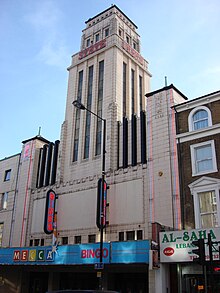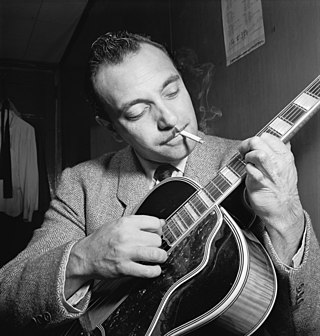
Gaumont State Cinema is a Grade II* listed Art Deco theatre located in Kilburn, a district in northwest London.

Gaumont State Cinema is a Grade II* listed Art Deco theatre located in Kilburn, a district in northwest London.
Designed by George Coles and commissioned and built by Phillip and Sid Hyams, the cinema opened in 1937. The Gaumont State was one of the biggest auditoria in Europe, with seating for 4,004 people. The name State is said to come from the huge 120 feet (37 m) tower, inspired by the Empire State Building in New York City. [1] [2] The exterior of the cinema is designed in an Art Deco Italian Renaissance style, covered in cream ceramic tiles. The tower, designed in the style of a 1930s New York skyscraper, can be seen for miles around, and bears the name "STATE" in large red neon letters. The interior was designed in the opulent style of cinemas of the day, and includes a Wurlitzer organ which is today one of the largest fully functioning Wurlitzer organs in Britain. It is also one of the few cinema organs remaining in their original locations. [3]
Entertainers Gracie Fields, Larry Adler and George Formby performed at the official opening broadcast live on BBC Radio on 20 December 1937. [4] Since then, the Gaumont State has been one of the most popular music venues in London and has hosted a number of historic performances. From the late 1980s until 2007 the building was run as a bingo hall by Mecca Bingo. In 2007 the bingo hall was closed, and the building and surrounding site were put up for sale. A campaign to "Save the Kilburn State" from unsympathetic property developers, and restore it as a cultural centre, was started in the same year by local residents. [5] The building was eventually acquired by Ruach City Church, led by Bishop John Anthony Francis and Co-Pastor Penny Francis. The building was bought 70 years to the day that the Gaumont State was first opened on 20 December 1937.


Jean Reinhardt, known by his Romani nickname Django, was a Romani-French jazz guitarist and composer. He was one of the first major jazz talents to emerge in Europe and has been hailed as one of its most significant exponents.

Kenneth Earl Burrell is an American jazz guitarist known for his work on numerous top jazz labels: Prestige, Blue Note, Verve, CTI, Muse, and Concord. His collaborations with Jimmy Smith were notable, and produced the 1965 Billboard Top Twenty hit Verve album Organ Grinder Swing. He has cited jazz guitarists Charlie Christian, Oscar Moore, and Django Reinhardt as influences, along with blues guitarists T-Bone Walker and Muddy Waters.
Gaumont may refer to:
"In a Sentimental Mood" is a jazz composition by Duke Ellington. He composed the piece in 1935 and recorded it with his orchestra during the same year. Lyrics were written by Manny Kurtz; Ellington's manager Irving Mills gave himself a percentage of the publishing, so the song was credited to all three. Other popular versions in 1935/36 were by Benny Goodman and by Mills Blue Rhythm Band. The opening notes of the song's melody resemble Gershwin's "Someone To Watch Over Me".

"Chicago" is a popular song written by Fred Fisher and published in 1922. The original sheet music variously spelled the title "Todd'ling" or "Toddling." The song has been recorded by many artists, but the best-known versions are by Frank Sinatra, Ben Selvin and Judy Garland. The song alludes to the city's colorful past, feigning "... the surprise of my life / I saw a man dancing with his own wife", mentioning evangelist Billy Sunday as having not been able to "shut down" the city, and State Street where "they do things they don't do on Broadway".

George Coleridge Emerson Goode was a British Jamaican-born jazz bassist best known for his long collaboration with alto saxophonist Joe Harriott. Goode was a member of Harriott's innovatory jazz quintet throughout its eight-year existence as a regular unit (1958–65). Goode was also involved with the saxophonist's later pioneering blend of jazz and Indian music in Indo-Jazz Fusions, the group Harriott co-led with composer/violinist John Mayer.
"It Don't Mean a Thing (If It Ain't Got That Swing)" is a 1931 composition by Duke Ellington with lyrics by Irving Mills. It is now accepted as a jazz standard, and jazz historian Gunther Schuller characterized it as "now legendary" and "a prophetic piece and a prophetic title". In 2008, Ellington's 1932 recording of the song was inducted into the Grammy Hall of Fame.
The Gaumont-British Picture Corporation produced and distributed films and operated a cinema chain in the United Kingdom. It was established as an offshoot of the Gaumont Film Company of France.

Buzz Bingo, Tooting is a Grade I listed building in Tooting, an area in the London borough of Wandsworth.
Roger Guérin was a French jazz trumpeter and singer.

Sam Woodyard was an American jazz drummer.

Troxy is a Grade II-listed Art Deco music venue on Commercial Road in Stepney, London. Built as a cinema in 1933, it closed in 1960 and became a training school for the London Opera Centre. In the 1980s the building was used as a bingo hall, and the Troxy was converted to a live events space in 2006. The building is considered a vital part of East London's history and was Grade II listed in 1990. It has a capacity of 3,100.

A number of Wurlitzer theatre organs were imported and installed in the United Kingdom in the period from 1925 to just before the Second World War (1939–45).

John Stanley Coombe Beard FRIBA, known professionally as J. Stanley Beard, was an English architect known for designing many cinemas in and around London.
Bradford Odeon is the name applied to two different cinemas in central Bradford, West Yorkshire, England. One, in Godwin Street, was built in 1930 and survives; the other, in Manchester Road, was built in 1938 and demolished in 1969.
Len Rawle was a Welsh organ builder and organist. A London College of Music graduate, he was particularly noted for his restoration of Wurlitzer theatre organs, such as at Harrow, Tooting and Woking.

The former Granada Cinema, also known as the Ebenezer Building or Cathedral of Christ Faith Tabernacle, in Woolwich, South East London, was built as a large and luxurious cinema in the 1930s. It had a seating capacity of nearly 2500 and is now being used as a church hall. The building with its extravagantly decorated interior is a Grade II* listed building.

The Embassy Cinema is a former cinema in the town of Chadwell Heath, Greater London. It was once known, among locals, as The Gaumont. It was designed in an art deco style, with a streamline moderne interior, by Harry Weston in 1934. The building is situated on the border of Redbridge and Barking & Dagenham, in the Chadwell Heath District Centre. The cinema closed in 1966 and became a Bingo Hall. In 2015, following the closure of the Bingo Hall, it was then used as a wedding hall/banqueting suite. The building was listed as an Asset of Community Value by the 'Chadwell Heath South Residents' Association' in August 2017 and is currently the focus of a major cinema restoration project.
"Django" is a 1954 jazz standard written by John Lewis as a tribute to the Belgian-born jazz guitarist Django Reinhardt. It was a signature composition of the Modern Jazz Quartet, of which Lewis was the pianist and musical director.
John Robert Bee was a British theatre organist who held solo positions at the Haymarket Theatre, Norwich, and The New Gaumont, Worcester. He broadcast regularly for the BBC in the 1930s and 1940s and toured extensively playing organ recitals in later life, being known as one of the 'Old Timers' of British theatre organists. His theme tune was ‘The Honeysuckle And The Bee’.